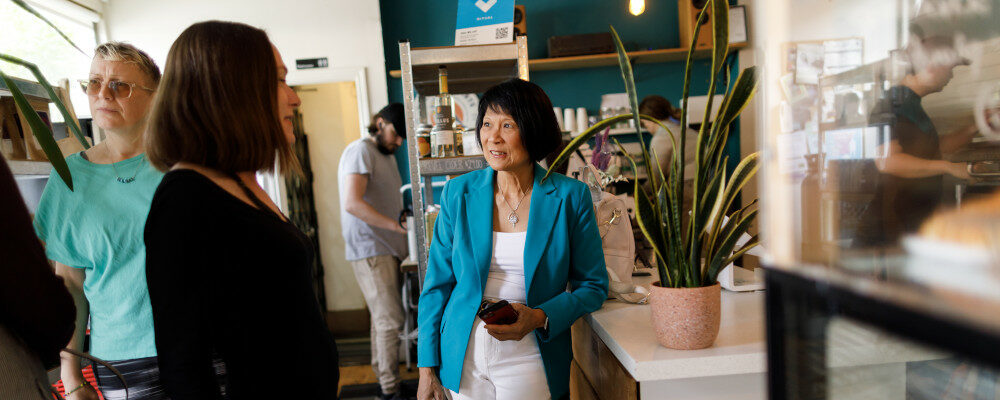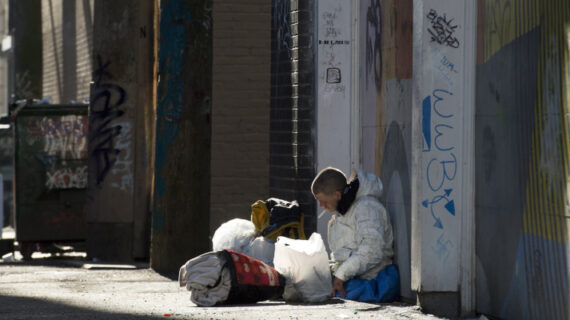Olivia Chow, the former NDP member of Parliament, is Toronto’s newest mayor after a byelection on Monday that was sparked by the surprise resignation of John Tory in February.
Chow took 37 percent of the vote, closely followed by former city councillor Ana Bailão with 32 percent and former police chief Mark Saunders with 8 percent of the vote.
What does it all mean? We’ve assembled some of The Hub‘s smartest contributors to explain why Chow won and what it means for Toronto.
Bad news for Toronto’s housing crisis
By Chris Spoke
I was excited about John Tory’s third term as mayor of Toronto. For the first time in his tenure, he had 1) strong mayor powers, 2) no re-election ambition, so was relatively unconstrained politically, and 3) finally accepted and acknowledged that housing in Toronto is expensive because there’s not enough of it. Specifically, he publicly committed to helping achieve the provincially-set target of 285,000 homes built over the next ten years—approximately 90 percent more than had been built over the last ten years.
That’s what you need to get more housing built in this city: an understanding that it needs to be built and the political cover and power to get it done.
As we all know, he then swiftly resigned. Bummer.
Olivia Chow is now the mayor of Toronto. She 1) promised to not make use of the new strong mayor powers, 2) as a first-term mayor, presumably does have re-election ambition, and 3) has said very little to signal that she understands that housing in Toronto is expensive because there’s not enough of it. Instead, she’s promised to strengthen renter protections, tax speculators, tax luxury homes, prevent renovictions, and build 25,000 rent-controlled homes over the next eight years. Only the last of those promises touches on the problem of scarcity and that in a very marginal way.
So: no understanding and very little political cover. I’m not nearly as excited or optimistic as I was just a few short months ago.
Chow ran like a frontrunner
By Dan Robertson
For the first two months, Mark Saunders ran like a front-runner, played it safe—especially on crime and affordability—took no risks, and was otherwise unmemorable.
When he realized with a month to go that he needed to shake things up, it was too late. At the same time, Chow positioned herself as the vessel for change, and—as the actual front-runner—ran a disciplined, low-risk campaign. She benefited from a lack of media scrutiny and the inability of her rivals to effectively attack her because of ridiculously low spending limits.
Progressives have mastered strategic voting
By Stuart Thomson
Any conservative strategist worth their salt knows that the last week of a federal election campaign will show a chunk of NDP-leaning voters surging toward the Liberals.
Dan Robertson, who has his own take on the mayoral election above, said it is the “CPC’s biggest obstacle to winning the next election.”
As Geoff Russ reported for The Hub, while Olivia Chow locked up the progressive vote, a half dozen centrist candidates battled for supremacy and split the vote in the process.
There’s something of a trend here. A recent byelection in Ontario saw the NDP vote cratering to the benefit of the Liberals, who made it a closer race than expected.
It was a remarkable sight in 2016 when the splintered Republican Party couldn’t get behind a single candidate to stop Donald Trump from becoming the candidate, while four years later the Democrats essentially made an institutional decision to back Joe Biden and freeze out Bernie Sanders.
Although nothing rises to Trumpian levels of impact, there is no shortage of stories in Canada about the Right being unable to sort out its difference, to the detriment of its political parties.
The stereotypes might suggest that left-leaning voters decide with their heart, while right-of-centre voters look at their options with clear-eyed rationality. The results suggest otherwise.
Toronto’s election reflects growing progressive takeover of Canada’s major cities
By Sean Speer
So much of Canada’s political conversation presumes that the country’s most pronounced fault line is regionalism. That our political identities and preferences are rooted in our home provinces. That a Calgarian necessarily has more in common with someone from Morinville than with a Torontonian or a Montrealer or a Vancouverite.
This common perspective is how we end up with the perception that our country’s politics are a sum of solitudes. That Alberta and Quebec are fundamentally different. Just as Ontario is different from Saskatchewan or British Columbia or whatever.
Recent big city elections—including this week’s mayoral byelection in Toronto—challenge this old narrative. They demonstrate that provinces aren’t monoliths. That to describe a homogenous Albertan political culture or an Ontario political culture for that matter fails to capture the differences within provinces and the similarities across them.
Olivia Chow’s impressive election win follows a consistent pattern of progressive primacy in Canada’s major cities. It’s reflected in the recent elections of Jyoti Gondek in Calgary, Amarjeet Sohi in Edmonton and Valérie Plante in Montreal who themselves build on the political successes of progressive big city mayors like Naheed Nensi, Don Iveson, Stewart Kennedy, and so forth.
(John Tory complicates this line of thinking a bit. Progressives believe he was a conservative because he previously led Ontario Progressive Conservative Party and opposed property tax increases. Conservatives generally reject him as having been predisposed to left-wing presumptions about identity politics and all the rest. Perhaps the mistake is to assume that he subscribed to a coherent worldview at all.)
The key point here is that these elections ought to put an end to the tendency to think and talk about our national politics mainly along regional lines. Chow has far more in common in terms of her worldview and policy priorities with Gondek than she does with more conservative mayors in smaller, peripheral, and rural communities in Ontario. The real fault line is less about regionalism and more about the country’s urban-rural divide.
Growing progressive dominance in Canada’s big cities is significant for a few reasons. First, if one accepts that housing and public safety are the biggest urban issues, it’s far from obvious, as David Frum and I recently discussed, that progressive ideas are likely to improve the situation. There’s a stronger likelihood in fact that they exacerbate these problems. Chow in particular seems poorly placed to make progress on boosting much-needed supply in the market-based share of Toronto’s housing market or addressing public concern’s about disorder and violence through greater law enforcement. The conventional progressive toolkit may be unresponsive to the issues of the moment.
Second, conservatives’ ongoing failure to make electoral in-roads in Canada’s major cities is a serious problem. The distribution of the country’s population (particularly the high concentration of immigration settlement in major cities) means that a conservative politics that fails to win in Toronto, Montréal and Vancouver basically cannot win national elections. We know this to be a truism: The Conservative Party has won the popular vote in the past two federal elections but ultimately lost because of its inability to win seats in and around a small number of big cities.
A big-city conservatism is therefore a major imperative for big “C” Conservative parties and small “c” conservative groups, thinkers, and activists. They must make conservative ideas relevant to the lives of big-city residents. Conservative MP Dane Lloyd is rightly starting to ask these questions. There’s a strong case for not overthinking too much. Housing supply and public safety ought to be so-called “sword issues” for conservatives.
Third, these outcomes ought to be a reminder to policymakers, political commentators, and the public as a whole that Canada is less divided along regional lines than is often assumed. The Alberta NDP just swept Edmonton and won 14 of 26 seats in Calgary in the provincial election. That ought to challenge the view that Alberta is a conservative bastion. Just as Doug Ford’s political salience in the Greater Toronto Area should be a corrective to the notion that Toronto is a left-wing monopoly from its downtown core to its sprawling suburbs. It’s time to break free from the old regionalist conception of national politics.
Canada’s major cities are increasingly defined by a progressive politics that trumps regional or provincial identities. Olivia Chow’s election is part of this national trend. The unknown question for her and her conservative opponents is whether her mayoral term reinforces these political developments or causes the city’s voters to ultimately look to conservatives for solutions to the problems it has wrought.




